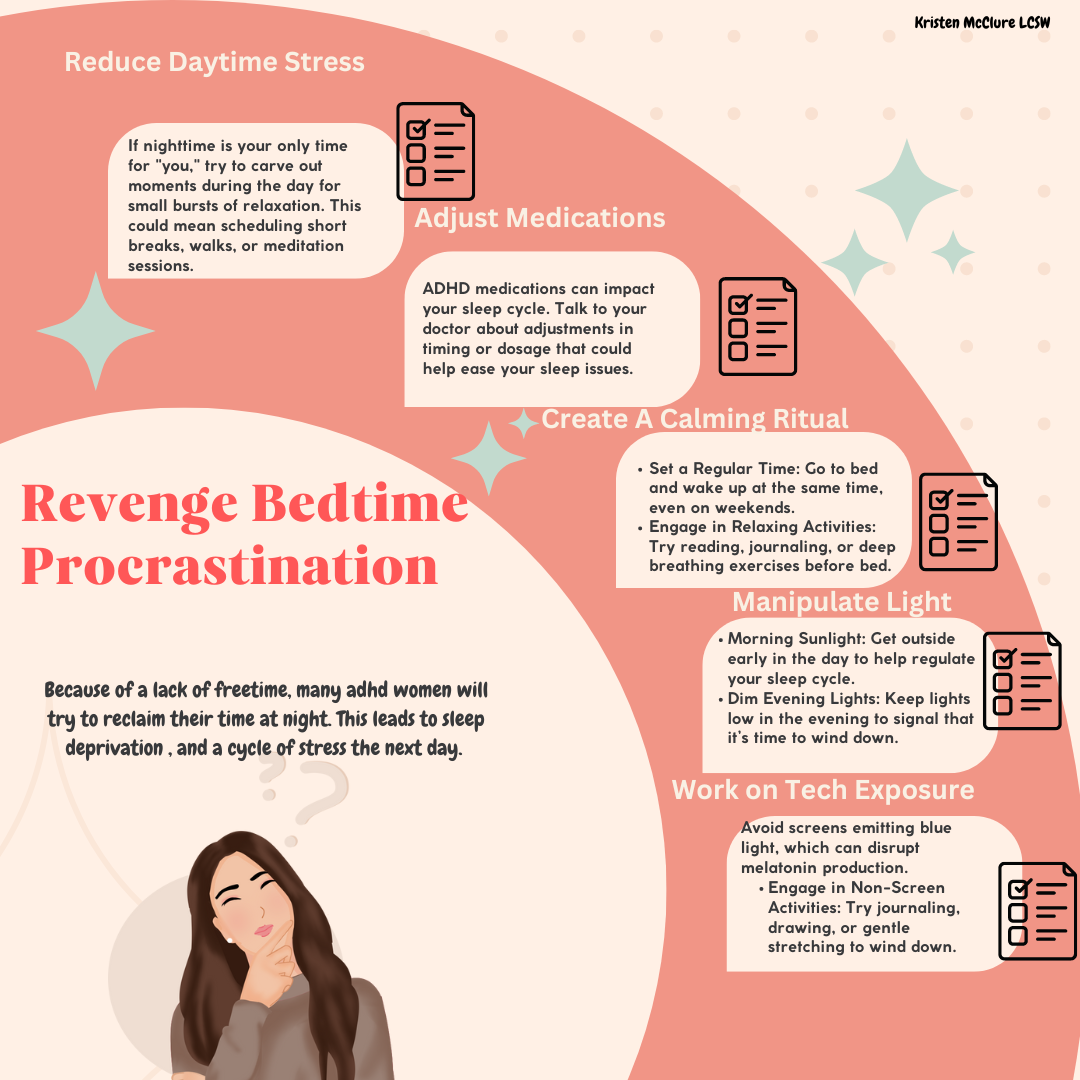
Revenge Bedtime Procrastination and ADHD: How to Break the Exhausting Cycle
Table of Contents
Toggletrong>REVENGE BEDTIME PROCRASTINATION AND ADHD: BREAKING THE CYCLE

Do You Stay Up Late, Even When You Know You Should Be Sleeping?
If you're an ADHD woman, you're not alone in staying up too late. Revenge Bedtime Procrastination (RBP) is a common struggle for many, especially women with ADHD. It’s all about trying to reclaim some personal time, but it comes at the expense of a good night’s sleep.
It can feel impossible to stop, but with some insight and the right tools, you can start breaking the cycle and finally get the rest you need!
Key Takeaways:
- Revenge Bedtime Procrastination (RBP) is when you stay up late to reclaim personal time but end up more tired the next day.
- ADHD makes it harder to break this cycle due to racing thoughts, difficulty relaxing, and tech distractions.
- RBP can weaken your immune system, disrupt emotional balance, and lead to brain fog.
- Solutions include building a calming bedtime routine, checking ADHD medications, limiting screen time, and adding morning exercise.
- Small, consistent changes can help you reclaim your nights and improve your sleep.
What is Revenge Bedtime Procrastination?
Revenge Bedtime Procrastination (RBP) happens when you stay up late to enjoy some free time because you didn’t get enough during the day. It’s about feeling like you’re in control of your time, but it often leads to feeling more tired and stressed the next day. This can be especially tough for ADHD women.
The ADHD Connection with Not Going to Bed
ADHD brains are wired differently, and that can make RBP even more challenging to break. Here's how ADHD can fuel this cycle:
- Struggling to relax: Your mind may still be racing, making it hard to wind down for sleep.
- Tech temptations: Late-night scrolling or binge-watching becomes a quick fix but keeps you up.
- Tough mornings: Staying up late means rough mornings, making it hard to reset the cycle.
If this sounds familiar, you’re not alone—lots of ADHD women face the same challenge.
Why We Fall Into the Trap of Bedtime Procrastination
ADHD brains don’t switch off easily. Here's why it can be tough to get to bed:
- Mental overload: Constant thoughts about what you didn’t finish or need to do tomorrow can keep you awake.
- Need for control: Staying up late feels like reclaiming your time, even though it costs you rest.
- Tech distractions: Social media, TV, or gaming provide a quick dopamine hit but make falling asleep harder.
The Health Toll of Revenge Bedtime Procrastination
RBP doesn’t just make you tired—it can have lasting effects on your health:
- Weakened immune system: Less sleep can leave you more prone to getting sick.
- Emotional rollercoaster: Poor sleep can make it harder to manage emotions, something ADHD already makes challenging.
- Mental fog: Without enough rest, it’s harder to think clearly and stay focused.
Breaking the Cycle of Staying Up Too Late: How to Reclaim Your Sleep
- Find small breaks during the day
If nighttime is your only "me-time," try scheduling short breaks during the day to decompress. A quick walk or meditation can help. - Check your meds
ADHD medications can impact your sleep. Talk to your doctor about tweaking the dosage or timing. - Set a calming bedtime routine
ADHD brains thrive on routines. Set a regular bedtime, even on weekends, and try relaxing activities like reading or deep breathing before bed. - Manage light exposure
Light plays a big role in your body’s sleep cycle. Get outside in the morning to reset your clock, and dim the lights in the evening to wind down. - Limit screen time
An hour of no screens before bed helps your brain settle down. Try journaling or drawing instead. - Exercise in the morning
Regular exercise can improve your sleep and mood. Aim for 30 minutes of activity, like a walk or yoga.
Make Bedtime Easier and Mindful
Routines don’t have to feel like a chore. Add some fun to your bedtime routine:
- Create small challenges: Make it a game to stick to your routine, or reward yourself for hitting sleep goals.
- Visualize better sleep: Imagine how much better you’ll feel tomorrow with a good night’s rest.
Conclusion: Reclaim Your Rest
Revenge Bedtime Procrastination can feel like a never-ending battle, but with the right strategies, you can break free. Start small—progress is what matters, not perfection. With a little patience and some tweaks to your routine, you’ll feel more rested and in control of your time.
Read an article on this in Scientific American below!
© 2024 kristen-mcclure-therapist.com. All Rights Reserved. Privacy Policy | Terms of Use




